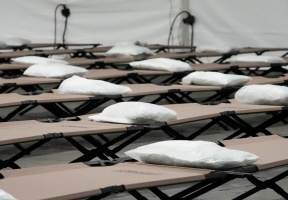
Advancing a data-driven plan to improve the asylum seeker response and provide safe shelter through the winter, Governor JB Pritzker and the Illinois Department of Human Services (IDHS) announced construction launched last week on two new shelter sites. The sites, a base camp in Brighton Park and a brick-and-mortar site in Little Village, will house up to 2,200 asylum seekers in total. The locations of the shelters were identified by the City of Chicago and both shelters will operate as part of the existing City of Chicago shelter system. Work to construct and operate the shelters is being funded by the State through Governor Pritzker’s recently announced $160 million investment to improve the asylum seeker pipeline as well as the $478 million in State funding that has been provided or committed to the asylum seeker response over state fiscal year 2023 and 2024. Both sites will offer warm sleeping spaces as well as meals, hygiene facilities, and wraparound services to allow asylum seekers, particularly those eligible for temporary protected status, to gain work permits and achieve self-sufficiency, thereby alleviating the strain on State and City resources. Construction, shelter operations and wraparound services will be funded by the State. In addition to a $65 million investment in these new shelter sites, the State is also making targeted, data-driven investments on the front and back end of the asylum seeker pipeline, to alleviate bottlenecks. Those investments are as follows:
1. WELCOME: $30 million to stand up a large intake center and deploy a welcome team to better support those coming to Chicago who are seeking another final destination, or who have sponsors in Illinois and don’t require shelter. With this approach, data indicates the number of new arrivals requiring shelter can be reduced by 10 percent.
2. INDEPENDENCE: $65 million in increased funding to expand the wraparound services the State currently provides at City shelters which enable new arrivals to live independently as they await asylum hearings, including case management, housing assistance, legal services, work permit processing, and workforce development support.








